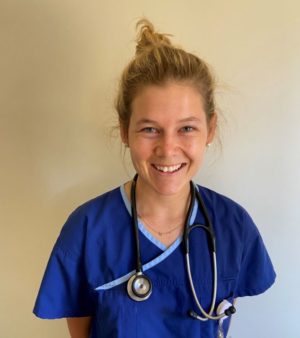
The College has recently commenced a pilot program to offer final year Flinders University medical students a 5-week rotation elective at Calvary North Adelaide Hospital. The four inaugural students were welcomed into Medical Oncology, ICU, Surgery and Obstetrics & Gynaecology and were supervised by Prof Nick Rieger, Dr Anthony Ciccocioppo, Dr David Rodda, Dr Tony Michele, Dr Jeff Hillen and Dr Matt Hooper. The pilot program would not have been possible without the hard work of A/Prof Sarah Thompson (Flinders University), Linnea Boileau (Work Integrated Learning Coordinator, Flinders University), Dr Jayanthi Jayakaran (Dean of People & Resources) and the support of Su White (Director of Clinical Services, Calvary North Adelaide), Steve Farrall (General Manager, Calvary North Adelaide), and Clinical Placement Facilitator, Linda Bozo.
This week we spoke to Emily Harcourt-Smith about her experience, and also learnt about what led her to study Medicine at Flinders.
What led you to Medicine? I grew up in a small rural town in Western Australia where medical services were lacking greatly, so much so that the our elderly population were moving away as there were not enough GPs or any after hour services. As I grew older it became apparent how much of a flow-on effect this has in terms of having a population to support small businesses … so I have pursued medicine with a hope to try and fill this gap in rural healthcare.
Why did you choose Flinders? I was really excited by the Parallel Rural Community Curriculum program – a whole rural year, with intermittent visits throughout the non-clinical years was very appealing. These placements have also been incredibly beneficial. I completed my 3rd year placement in Waikerie and often reflect on how central that experience has been to my development as a professional. I think one of the major benefits was the exposure to a whole range of different medical procedures, and the trust that the local community place in visiting medical students. I was fortunate enough to plaster fractures, suture wounds, participated in complex procedures and even welcomed a couple of babies into the world!
Living in the community also means that you become a part of it: I made new friends, competed in hockey for the local team, played social netball and learnt a lot about what it means to live in and contribute to a rural community.
What’s a highlight of your student life at Flinders? As a second year student I participated in the RFDS ‘Ride Along’ program. The day I was allocated I was lucky enough to fly out to Alice Springs to pick up three patients who required transfer to Adelaide for further medical treatment. It was amazing to see how the nurses, paramedics and pilots all worked together, and the important link RFDS provides for rural and remote patients. It’s also a pretty amazing office to work in for these health professionals! On a more ongoing basis, a real highlight is the one-on-one teaching, support and guidance I have received from many mentors along the way.
What have been some of the highlights of the pilot program at Calvary? The Calvary program is unique as it gives students the opportunity to experience the private sector, and also have very personalised teaching from consultants, each of whom I found to be incredibly generous with their time and practice. I was the only student placed with the surgical team, which was awesome as it allowed me to get very hands-on experience in surgery. Closing multiple surgeries and assisting for a bowel resection were some of the absolute highlights from this placement, and an experience I will always remember!
How did the pandemic prepare you for your future professional career? 2020 was incredibly challenging. I had never been so acutely aware of how underprepared we were as a society for a pandemic and, upon reflection of the last 12 months, I am impressed at the speed of which changes were made and resources allocated. COVID prepared me by highlighting the importance of good communication between different stakeholders, and ensuring that we prioritise protection of our medical staff and high risk populations.
What area of medicine do you see yourself practicing in? All placements I have done so far have been very interesting and I have thoroughly enjoyed them. I envisage a career with a procedural hands-on element, and endeavour to complete some of my career in a rural/remote setting.

